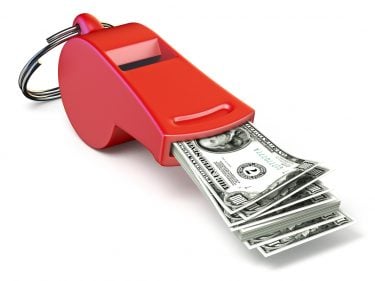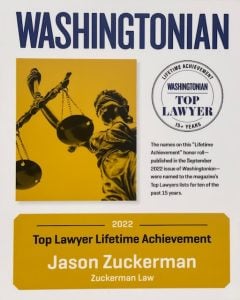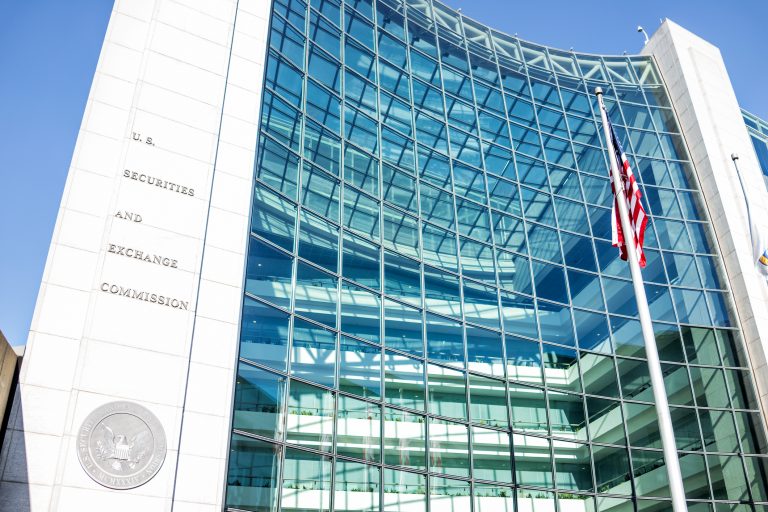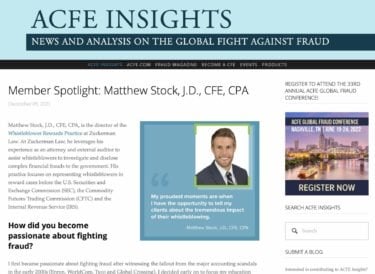SEC Whistleblower Program
 The SEC Whistleblower Program offers awards to eligible whistleblowers who provide original information that leads to successful SEC enforcement actions with total monetary sanctions exceeding $1 million. A whistleblower may receive an award of between 10% and 30% of the total monetary sanctions collected in actions brought by the SEC and in related actions brought by other regulatory or law enforcement authorities. The SEC Whistleblower Program allows whistleblowers to submit tips anonymously if represented by an attorney in connection with their tip.
The SEC Whistleblower Program offers awards to eligible whistleblowers who provide original information that leads to successful SEC enforcement actions with total monetary sanctions exceeding $1 million. A whistleblower may receive an award of between 10% and 30% of the total monetary sanctions collected in actions brought by the SEC and in related actions brought by other regulatory or law enforcement authorities. The SEC Whistleblower Program allows whistleblowers to submit tips anonymously if represented by an attorney in connection with their tip.
Our clients’ SEC whistleblower tips have helped the SEC halt more than $1 billion in fraudulent investment schemes.
Since the inception of the SEC Whistleblower Program, the SEC has paid more than $1.9 billion in awards to whistleblowers, including seven awards to our clients. The largest SEC whistleblower awards to date are $279 million, $114 million, $110 million, and $50 million. See a summary of the SEC whistleblower cases that have resulted in large awards. In FY 2023, the SEC awarded nearly $600 million—the highest annual total by dollar value in the Program’s history—to 68 individual whistleblowers.
Experienced and effective SEC whistleblower attorneys can provide critical guidance and effective advocacy to whistleblowers to increase the likelihood that they get the maximum award from the SEC Whistleblower Program.






We have obtained awards for eight SEC whistleblowers. The orders announcing those awards noted our clients’ significant assistance to SEC staff that led to SEC enforcement actions and enabled the SEC to conserve resources.
Contact us today to find out the strategies that we have successfully employed to secure SEC whistleblower awards for our whistleblower clients from the SEC Whistleblower Program.
Our firm’s SEC whistleblower attorneys have secured awards for whistleblowers disclosing a wide range of federal securities violations, including:
- Accounting fraud;
- Investment fraud;
- Ponzi schemes;
- Foreign bribery and FCPA violations;
- EB-5 investment fraud;
- Fraudulent securities offerings;
- Improper revenue recognition;
- Inadequate internal controls; and
- Violations of auditor independence rules.
SEC Whistleblower Program’s Success
In 2010, Congress created the SEC Whistleblower Program to “motivate those with inside knowledge to come forward and assist the Government to identify and prosecute persons who have violated securities laws and recover money for victims of financial fraud,” S. Rep. No. 111-176, at 110 (2010).
In its short history, the SEC Whistleblower Program has enabled the SEC to uncover significant investment fraud schemes and halt ongoing fraud. Since 2011, the SEC Whistleblower Office has received over 62,000 tips. The SEC has paid more than $1.9 billion in awards to whistleblowers for providing information that led to successful enforcement actions. According to a recent report of the SEC Office of the Whistleblower, “[e]nforcement actions brought using information from meritorious whistleblowers have resulted in orders for more than $6.3 billion in total monetary sanctions, including more than $4.0 billion in disgorgement of ill-gotten gains and interest, of which more than $1.5 billion has been, or is scheduled to be, returned to harmed investors.”
See our article in Forbes, One Billion Reasons Why the SEC Whistleblower-Reward Program is Effective, which former SEC Commissioner Kara M. Stein cited in her Statement on Proposed Amendments to the Commission’s Whistleblower Program Rules.
Anonymous Reporting to SEC Whistleblower Program
 Under the rules of the SEC Whistleblower Program, whistleblowers have the ability to report anonymously if represented by an attorney. A skilled whistleblower attorney will be able to skillfully guide a whistleblower through the process, maximizing the likelihood that their identity is not revealed. The SEC Whistleblower Program also offers substantial protection against retaliation.
Under the rules of the SEC Whistleblower Program, whistleblowers have the ability to report anonymously if represented by an attorney. A skilled whistleblower attorney will be able to skillfully guide a whistleblower through the process, maximizing the likelihood that their identity is not revealed. The SEC Whistleblower Program also offers substantial protection against retaliation.
For more information about the SEC Whistleblower Program, see our Whistleblower Page and download the eBook Tips from SEC Whistleblower Attorneys to Maximize an SEC Whistleblower Award. Click below to hear an SEC whistleblower lawyer’s tips for SEC whistleblowers:
Tier 1 Law Firm Successfully Representing Whistleblowers at SEC Whistleblower Program
 If you have information about securities fraud or other violations, contact an experienced SEC whistleblower attorney at Zuckerman Law for a free, confidential consultation by calling us at 202-930-5901 or 202-262-8959.
If you have information about securities fraud or other violations, contact an experienced SEC whistleblower attorney at Zuckerman Law for a free, confidential consultation by calling us at 202-930-5901 or 202-262-8959.
Zuckerman Law, one of the nation’s leading law firms representing whistleblowers in whistleblower rewards and whistleblower retaliation claims, will work to quickly provide you with the highest-quality representation at the SEC Whistleblower Program to maximize your likelihood of recovering and maximizing an SEC whistleblower award. We represent whistleblowers worldwide.
Recently the Association of Certified Fraud Examiners published a profile of Matt Stock’s success working with whistleblowers to fight fraud:
Click here to learn more about anti-retaliation protections for SEC whistleblowers under the Dodd-Frank Act and Sarbanes-Oxley Act.
Reasons to Reward Whistleblowing to the SEC and Benefits of the SEC Whistleblower Program
As discussed in rulemaking concerning the SEC whistleblower program, there are many tangible benefits to the program:
- Encouraging potential whistleblowers to provide information on possible violations increases the effectiveness of the SEC’s enforcement activities. More effective enforcement leads to earlier detection of violations and increased deterrence of potential future violations, which should assist in a more efficient allocation of investment funds.
- Serious securities frauds can cause inefficiencies in the economy by diverting investment funds from more legitimate, productive uses. If investors fear theft, fraud, manipulation, insider trading, or conflicted investment advice, their trust in the markets will be low, in both the primary market for issuance and the secondary market for trading. This would prompt investors to demand a higher risk premium for holding securities, increasing the cost of raising capital and impairing capital formation (relative to the case where rules against such abuses were in effect and properly enforced and obeyed). To the extent that the SEC whistleblower program increases deterrence of potential future violations, investors’ trust in the securities markets increases. This increased investor trust will promote lower capital costs as more investors enter the market, and as investors generally demand a lower risk premium due to a reduced likelihood of securities fraud.
- By increasing the likelihood of detecting misconduct, the SEC whistleblower program reduces the unfair competitive advantages that some companies can achieve by engaging in undetected violations.
SEC Whistleblower Program’s Annual Reports to Congress
To learn more about the SEC Whistleblower Program’s results, see the SEC Office of the Whistleblower’s Annual Reports to Congress:
- 2011 Annual Report to Congress on the SEC Whistleblower Program
- 2012 Annual Report to Congress on the SEC Whistleblower Program
- 2013 Annual Report to Congress on the SEC Whistleblower Program
- 2014 Annual Report to Congress on the SEC Whistleblower Program
- 2015 Annual Report to Congress on the SEC Whistleblower Program
- 2016 Annual Report to Congress on the SEC Whistleblower Program
- 2017 Annual Report to Congress on the SEC Whistleblower Program
- 2018 Annual Report to Congress on the SEC Whistleblower Program
- 2019 Annual Report to Congress on the SEC Whistleblower Program
- 2020 Annual Report to Congress on the SEC Whistleblower Program
- 2021 Annual Report to Congress on the SEC Whistleblower Program
How to Report Information to the SEC Whistleblower Program and Qualify for an SEC Whistleblower Award
The SEC whistleblower process is lengthy and complex. See below for articles responding to frequently asked questions by SEC whistleblowers.
- What is the SEC Office of the Whistleblower?
- What are the largest SEC whistleblower awards?
- Can I submit a tip anonymously to the SEC Office of the Whistleblower?
- What exactly does anonymous whistleblowing entail?
- What employment protections are available for SEC whistleblowers?
- What violations qualify for an SEC whistleblower award?
- Can the SEC bring enforcement actions against international schemes?
- Who is an “eligible” SEC whistleblower?
- Can compliance personnel, auditors, officers or directors qualify for SEC whistleblower awards?
- Can I submit a claim if I had some involvement in the fraud or misconduct?
- Can culpable whistleblowers qualify for SEC whistleblower awards?
- Do I have to report a potential violation to my company before reporting it to the SEC?
- What type of evidence should I provide to the SEC?
- Can I use confidential company documents to expose fraud?
- Can I disclose secret recordings to the SEC?
- Can I submit a tip if I agreed to a confidentiality provision in an employment/severance agreement?
- When is the best time to report the fraud or misconduct to the SEC?
- What is “original information”?
- Can I submit an SEC Whistleblower claim if the SEC already has an open investigation into the matter?
- How might my information “lead to” a successful SEC enforcement action?
- What “related actions” qualify for an SEC whistleblower award?
- How do the best SEC whistleblower law firms advocate for whistleblowers?
- How do I choose the best whistleblower attorney?
- Why should I choose the Zuckerman Law to represent me in my SEC whistleblower claim?
- How do I submit a tip to the SEC Office of the Whistleblower?
- What happens after I submit a tip to the SEC Office of the Whistleblower?
- What is the full process for a whistleblower to receive an award?
- What factors does the SEC consider when determining the amount of the award?
- What happens after I apply for an SEC whistleblower award?
- What is the process to appeal the SEC’s award determination?
- How long does it take to receive an SEC whistleblower award?
SEC Whistleblower Program Sets Records in 2021
- In FY 2021, the SEC received more than 12,200 whistleblower tips—the largest number of whistleblower tips received in a fiscal year, which represents an approximate 76% increase over FY 2020.
- From FY 2012 to FY 2021, the number of whistleblower tips submitted to the SEC has grown by approximately 300%. In light of recent large awards, the SEC will likely continue to attract a high volume of whistleblower tips.
- Since the inception of the SEC Whistleblower Program, the SEC has received more than 52,400 whistleblower tips and awarded approximately $1.1 billion to 226 individuals.
- During FY 2021, the SEC awarded approximately $564 million to 108 individuals —both the largest dollar amount and the largest number of individuals awarded in a single fiscal year. The two largest SEC whistleblower awards in the program’s history were paid in FY 2021 — a $114 million award to one whistleblower in October 2020 and a $110 million award to another in September 2021.
- In FY 2021, the most common violations reported by whistleblowers were Manipulation (25%), Corporate Disclosures and Financials (16%), Offering Fraud (16%), Trading and Pricing (6%), and Initial Coin Offerings and Cryptocurrencies (6%).
- The SEC continues to attract tips from whistleblowers worldwide. In FY 2021, SEC received tips from individuals in 99 foreign countries, as well as from every state in the United States and the District of Columbia. And approximately 20% of the whistleblowers that received awards in FY 2021 were based outside of the United States.
- Of the whistleblowers who received awards in FY 2021, approximately 56% provided original information that caused staff to open an investigation or examination, and approximately 44% received awards because their original information significantly contributed to an already existing investigation or examination.
- Approximately 60% of the award recipients in FY 2021 were current or former insiders of the entity about which they reported information of wrongdoing. Of those recipients, more than 75% raised their concerns internally to their supervisors, compliance personnel, or through internal reporting mechanisms, or understood that their supervisor or relevant compliance personnel knew of the violations, before reporting their information of wrongdoing to the SEC.
- Whistleblowers who received awards in FY 2021 assisted the SEC in bringing enforcement cases involving an array of securities violations, including offering frauds, such as Ponzi schemes, false or misleading statements in a company’s offering memoranda or marketing materials, accounting violations, internal controls violations, and Foreign Corrupt Practices Act.
SEC Whistleblower Attorneys
We have substantial experience investigating securities fraud schemes and preparing effective submissions to the SEC concerning a wide range of federal securities violations, including:
- Accounting fraud;
- Investment fraud;
- Ponzi schemes;
- Foreign bribery and FCPA violations;
- Cryptocurrency fraud;
- EB-5 investment fraud;
- Fraudulent securities offerings;
- Improper revenue recognition;
- Inadequate internal controls;
- Deceptive non-GAAP financials;
- Manipulation of a security’s price or volume;
- Insider trading;
- Hedge fund fraud;
- Unregistered broker-dealers;
- Investment adviser fraud;
- Anti-money laundering violations;
- False or misleading statements about a company or investment;
- Violations of auditor independence rules; and
- Misleading or incomplete cybersecurity disclosures.
Top-Rated SEC Whistleblower Lawyers
We have assembled a team of leading whistleblower lawyers to provide top-notch representation to SEC whistleblowers at the SEC Whistleblower Program. Recently Washingtonian magazine named two of our attorneys top whistleblower lawyers.
U.S. News and Best Lawyers® have named Zuckerman Law a Tier 1 firm in Litigation – Labor and Employment in the Washington DC metropolitan area.
- Matt Stock is a Certified Public Accountant, Certified Fraud Examiner and former KPMG external auditor. As an auditor, Stock developed expertise in financial statement analysis and internal controls testing and fraud recognition. He uses his auditing experience to help IRS, CFTC and SEC whistleblowers investigate and disclose complex financial frauds to the government and develop a roadmap for the SEC to take an enforcement action. Matt has been interviewed on CNBC, quoted extensively about whistleblower rewards in the media, and is the lead author of SEC Whistleblower Program: Tips from SEC Whistleblower Attorneys to Maximize an SEC Whistleblower Award.
- Described by the National Law Journal as a “leading whistleblower attorney,” founding Principal Jason Zuckerman has established precedent under a wide range of whistleblower protection laws and obtained substantial compensation for his clients and recoveries for the government in whistleblower rewards and whistleblower retaliation cases. He served on the Department of Labor’s Whistleblower Protection Advisory Committee, which makes recommendations to the Secretary of Labor to improve OSHA’s administration of federal whistleblower protection laws. Zuckerman also served as Senior Legal Advisor to the Special Counsel at the U.S. Office of Special Counsel, the federal agency charged with protecting whistleblowers in the federal government. At OSC, he oversaw investigations of whistleblower claims and obtained corrective action or relief for whistleblowers.
- Zuckerman was recognized by Washingtonian magazine as a “Top Whistleblower Lawyer” (2020, 2018, 2017, 2015, 2009, and 2007), selected by his peers to be included in The Best Lawyers in America® in the category of employment law (2011-2024) and in SuperLawyers in the category of labor and employment law (2012 and 2015-2024), is rated 10 out of 10 by Avvo, based largely on client reviews, and is rated AV Preeminent® by Martindale-Hubbell based on peer reviews
- We have published extensively on whistleblower rights and protections, and speak nationwide at seminars and continuing legal education conferences. We blog about new developments under whistleblower retaliation and rewards laws at the Whistleblower Protection Law and SEC Awards Blog, and in 2019, the National Law Review awarded Zuckerman its “Go-To Thought Leadership Award” for his analysis of developments in whistleblower law.
- Our attorneys have been quoted by and published articles in leading business, accounting, and legal periodicals, including The Wall Street Journal, Forbes, CNBC, MarketWatch, Vox, Accounting Today, Going Concern, Law360 – Expert Analysis, Investopedia, The National Law Review, inSecurities, Government Accountability Project, S&P Global Market Intelligence, Risk & Compliance Magazine, The D&O Diary, The Compliance and Ethics Blog, Compliance Week and other printed and electronic media.
SEC Whistleblower Program’s Protections Against Retaliation
Several federal and state laws protect corporate whistleblowers. We routinely represent whistleblowers in Sarbanes-Oxley whistleblower retaliation cases. For an overview of SOX whistleblower protection, download our titled Sarbanes-Oxley Whistleblower Protection: Robust Protection for Corporate Whistleblowers:
How to Successfully Navigate the SEC Whistleblower Process
Resources for SEC Whistleblowers
To find out more about the SEC Whistleblower Program from a leading SEC whistleblower law firm, see the following resources:
- Tips for SEC Whistleblowers
- Leading SEC Whistleblower Law Firm Featured in Article About Growing Wave of Whistleblower Lawsuits
- How the SEC Whistleblower Program Has Changed Corporate Compliance and SEC Enforcement
- SEC Whistleblower Reward Program FAQ
- Auditors’ and accountants’ guide to SEC whistleblower awards
- Whistleblower Protections and Incentives for Auditors and Accountants
- How to Report EB-5 Fraud and Earn an SEC Whistleblower Award
- CFTC Strengthens Anti-Retaliation Protections for Whistleblowers and Improves CFTC Whistleblower Award Program
- SEC Cracking Down on Ponzi Schemes
- SEC Scrutinizes “Fake News” Stock Promotion Schemes
- SEC Whistleblower Program: Exposing Insider Trading
- SEC Awards for Disclosures of Foreign Bribery or FCPA Violations
- Whistleblower Rewards and Bounties for Disclosures of Market Manipulation Schemes
- SEC Targeting Investment Adviser Fraud
- Compliance Personnel, Auditors, Officers and Directors Can Obtain SEC Whistleblower Awards
- Money Laundering and the SEC Whistleblower Program
- International Whistleblower Representation – SEC Whistleblower Attorney
- Anonymous Whistleblowing: Does the SEC Whistleblower Program Protect a Whistleblower’s Identity?
- SEC Awards for Disclosures of Foreign Bribery or FCPA Violations
- Securities Fraud Enforcement Action Prompts the Question: What Was the Company Smoking?
- Compliance Officer Whistleblower Representation
- SEC Whistleblower Program: What is the SEC Form TCR?
- Tale of Two Whistleblowers: Lessons Learned from Today’s SEC Whistleblower Award
- Whistleblowers Help CFTC Obtain Record Penalties for Commodities Fraud
- Report Underscores Importance of Whistleblower Rewards and Protections for Internal Auditors
- SEC Sanctions: Whistleblower Reference Guide
- Protections and Rewards for Cybersecurity Whistleblowers
- CFTC Announces Second Whistleblower Award in 2016 as the Agency’s Whistleblower Reward Program Picks Up Steam
- EB-5 Visa Scandal Underscores the Critical Role Whistleblowers Play in Exposing EB-5 Fraud
- SEC Enforcement Director Touts Success of SEC Whistleblower Program
- SEC Whistleblower Program Not Limited to Corporate Insiders
- SEC Pays $3M Award to Whistleblower
- SEC Draft Strategic Plan Affirms the Importance of the SEC’s Whistleblower Reward Program
- Whistleblower Lawyer Interviewed About SEC Whistleblower Award
- SEC Whistleblower Lawyer Quoted in National Law Journal About SEC Whistleblower Program
- SEC Whistleblower Lawyer Zuckerman Quoted About SEC Whistleblower Award for Independent Analysis
- SEC Whistleblower Lawyer Jason Zuckerman Quoted About Tips for SEC Whistleblowers
- Whistleblower Lawyer Jason Zuckerman Quoted About SEC Whistleblower Award
- Whistleblower Lawyer Interviewed About the Rise of Cybersecurity Whistleblowing
- Whistleblower Attorney Zuckerman Quoted in Washington Post About SEC Order
- Whistleblower Attorney Dallas Hammer Interviewed by Bloomberg About Dodd-Frank Protected Whistleblowing
- SEC Whistleblower Lawyer Zuckerman Quoted About SEC Whistleblower Award for Independent Analysis





